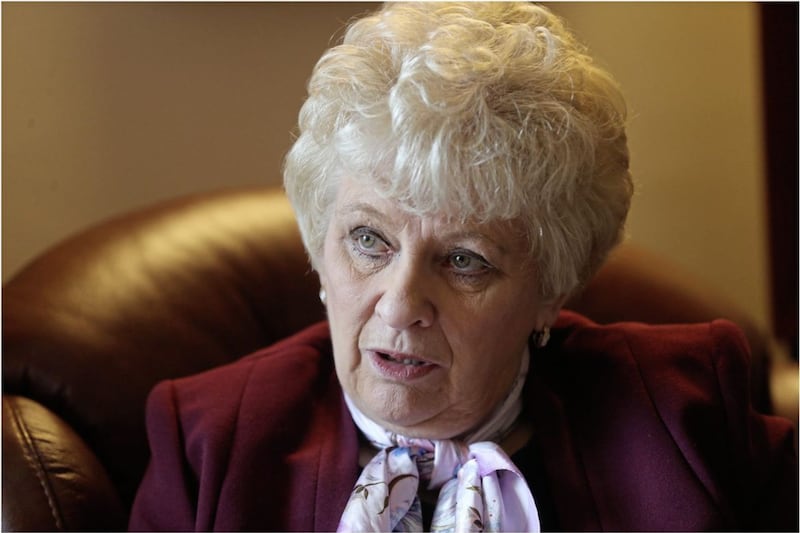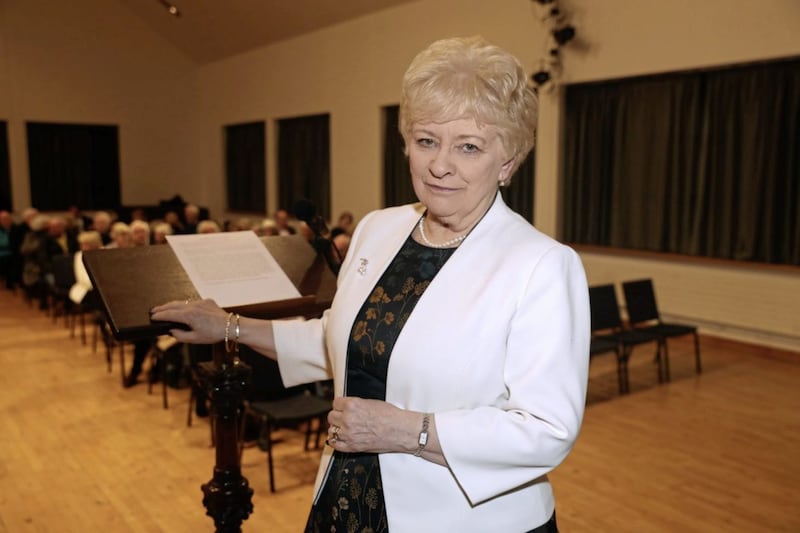
WE must, as Christians and as citizens, continue to try to assert that most precious, and for us sacred, right - the right to life.
Using the language of compassion, care and rights, the pro-choice lobby offer what purports to be simple easy solutions.
But birth and death are not easy. The proclamation of the right to kill the unborn child and to terminate life is not a matter to be accepted without challenge.
They are the two most fundamental moments of our lives. We must continue to speak up.
We need to speak up on behalf of not just the unborn but also the vulnerable, the disabled, the trafficked, the enslaved, the persecuted religious minorities of the world, the marginalized and the deprived.
In this community in particular we need to speak up for and do all we can to help the often silent victims of the Troubles.
We know that trauma is trans-generational - the trauma of the last 50 years is still visible in this country.
We have to do all we can to ensure that the legacy of the past is dealt with, that healing comes and that justice is seen to be present.
Great work is being done to attempt to unite our divided society.
It is for the most part forward-looking, but there are those for whom the past is the present, and it surely is our duty to try and ensure that justice, mercy, compassion and love form part of our response to the past, so that we enable the future and bring hope to our people.
It is happening, but it is too slow. The truth, we now know, is that those who hoped that as people died the injustices and wrongs of the past would be forgotten were wrong.
Think about the recent pictures of the Bloody Sunday commemoration. Or think about the children and grandchildren of the Disappeared, who continue to support those who still seek the recovery of the bodies of the three remaining Disappeared so that they can lay them to rest. The trauma simply passes from one generation to another.
Our politicians cannot continue to quibble endlessly about the detail of a historic investigations unit - they need to ensure that robust and effective mechanisms, properly funded, are made available to heal the many sore wounds of our troubled past. Then we will really be able to build our solid future.
Christians have another duty too - to be brave and to proclaim that God is, not only to offer religious values to inform society's decision-making, but also to offer spiritual realities, to encourage belief, to model belief, to make it possible for people again to say publicly, "I believe in God and that is the reason I live my life as I do".
We live in a country with soaring suicide rates. In 1970, 73 people died of suicide. In 2018 the figure was 307.
Over 5,000 people in Northern Ireland have died by suicide since the Good Friday Agreement; 3,700 people are recorded as having died during the Troubles. Our suicide rate now far exceeds the murders of the Troubles.
How has this come to pass? Why do so many people decide that there is no hope - that death is the only way to stop the pain which torments them?
We know some of the reasons - we know that many people die after drugs, alcohol, of Troubles-related traumas - but we know too that Christianity brings hope.
The proclamation of the right to kill the unborn child and to terminate life is not a matter to be accepted without challenge. They are the two most fundamental moments of our lives. We must continue to speak up
I was reading recently the powerful homily which St Óscar Romero gave on March 24 1980.
Among other things, speaking of the battle for peace in an escalating civil war, he said this: "Many do not understand, and they think Christianity should not get involved in such things.
"But, to the contrary, you have just heard Christ's Gospel, that one must not love oneself so much as to avoid getting involved in the risks of life which history demands of us, that those who would avoid the danger will lose their life, while those who out of love for Christ give themselves to the service of others will live, like the grain of wheat that dies, but only apparently.
"If it did not die, it would remain alone. The harvest comes about because it dies, allows itself to be sacrificed in the earth and destroyed.
"Only by destroying itself does it produce the harvest."
Minutes later Óscar Romero was shot dead as he continued to celebrate Mass in the modest chapel of Divine Providence Hospital in San Salvador.
So this is no glib calling. This Gospel of ours is fundamentally and totally demanding.
It requires of each of us that we see the face of Christ in all whom we meet, that we respond totally to those who need our help, that we are never too tired or too busy. It is actually profoundly difficult to be a true Christian.
I have been much privileged in the opportunities which have been given to me over the years.
As a Christian I have learned that faith must be lived in the world in which we live, with the people whom we meet. It is not an intellectual exercise
I heard early the words of Micah: "This is what the Lord asks of you: only this, to act justly, to love tenderly and to walk humbly with your God."
They really impacted on me, so simple yet so profound - like a motto for life: act justly, love tenderly and walk humbly.
The work which I do relates to social justice matters - human rights, the abolition of the death penalty, justice and security, accountability of policing and power, the protection of the right to life both in the womb and at the end of life.
Such discipleship is never simple. It can be intellectually challenging - for example if one accepts that medical technology has rightly brought us lung transplants and amazing advances in saving premature babies and so many other developments, is it right or wrong to replace a defective battery cell with one which is not defective which is harvested from another mother?
They say such children have three parents. Can this be what God intended?
One question, of course, is how is that battery cell or mitochondria secured? What may be the ongoing consequences?
And if women are being paid £500 a time to allow their eggs to be harvested so that the healthy mitochondria can be extracted, is that wrong?
And who are those women? There are undoubtedly altruistic donors, but most of them are women who need money to feed their children or provide a home.
Serious risks attach to the procedure, even of life threatening renal failure.
All the women therefore are not necessarily true volunteers. Is that permissible?
How do we fight the commercial exploitation of women's vulnerability? Should we? What can you or I as Christians do?
I think, too, of all those people coming from Africa, from Syria, from so many other countries in the hope of a better life.
They come from places of huge natural wealth. The reality is that those countries' assets are very often stripped out by corrupt rulers and even by multinationals, leaving their people in penury.
So what do we do about the current problems of the mass movement of peoples? As Christians we make donations to appeals.
Do we pray that someone else will solve the problem? Is that enough? It is not enough to be shocked.
It can seem a bit overwhelming. The corrupt exercise of power is hard to challenge, especially when it reposes in the hands of oligarchs, presidents, and multinationals.
It can seem an insuperable task. It will only be achieved in small steps.
That does not matter. That the steps may have to be small, must not be a deterrent for us in trying.
As a Christian I have learned that faith must be lived in the world in which we live, with the people whom we meet. It is not an intellectual exercise.
Each of us is called to live our faith as Christians. We live where we find ourselves; our challenge is to really live in faith, so it is perhaps appropriate to end with some words which are attributed to St Augustine of Hippo.
"God of our life, there are days when the burdens we carry chafe our shoulders and weigh us down; when the road seems dreary and endless, the skies grey and threatening; when our lives have no music in them, and our hearts are lonely, and our souls have lost their courage.
"Flood the path with light, run our eyes to where the skies are full of promise; tune our hearts to brave music; give us the sense of comradeship with heroes and saints of every age; and so quicken our spirits that we may be able to encourage the souls of all who journey with us on the road of life, to Your honour and glory."
Abridged from Baroness Nuala O'Loan's St Brigid's Day lecture, given in St Brigid's Parish, Belfast this month. The first part can be found here.









